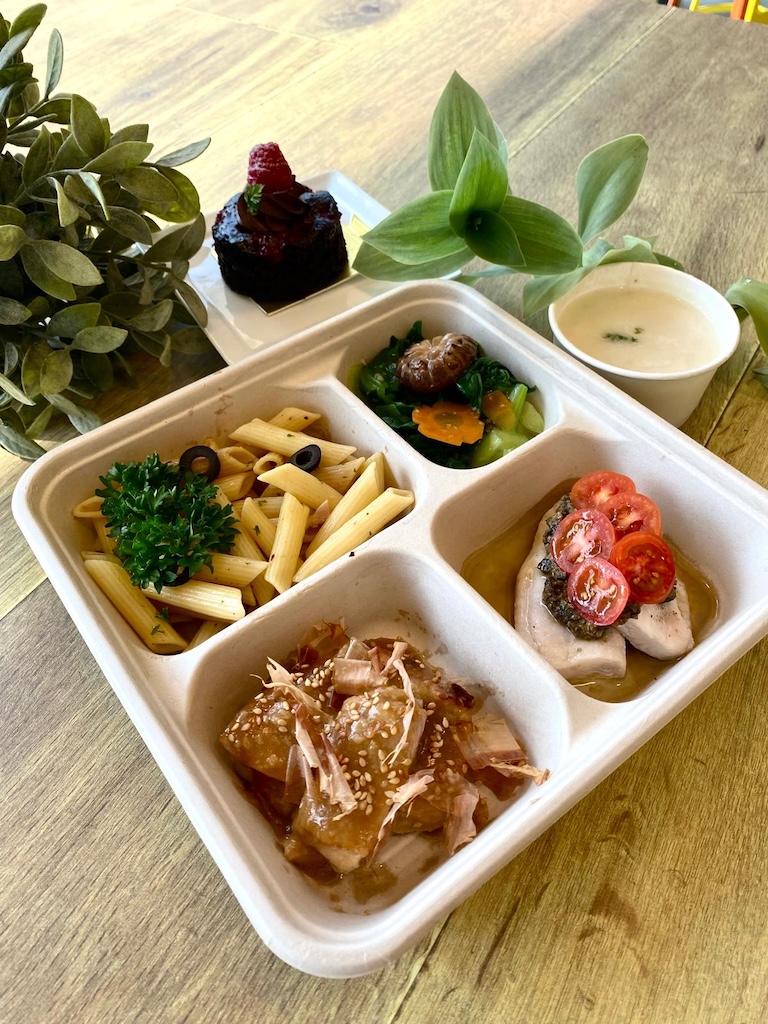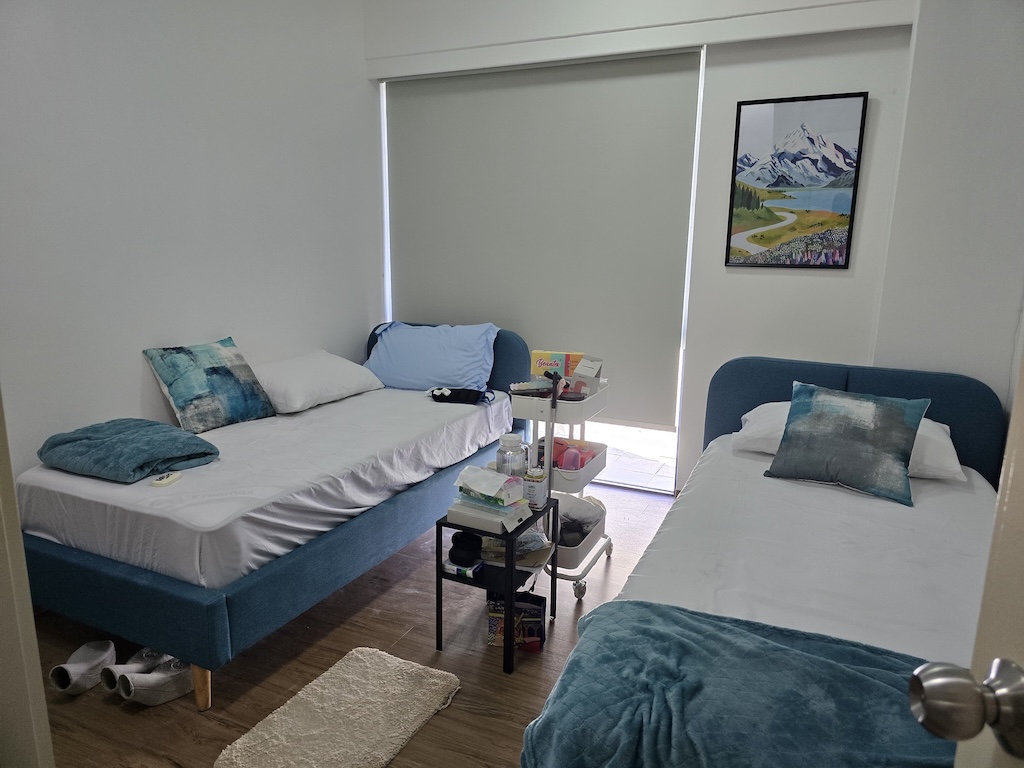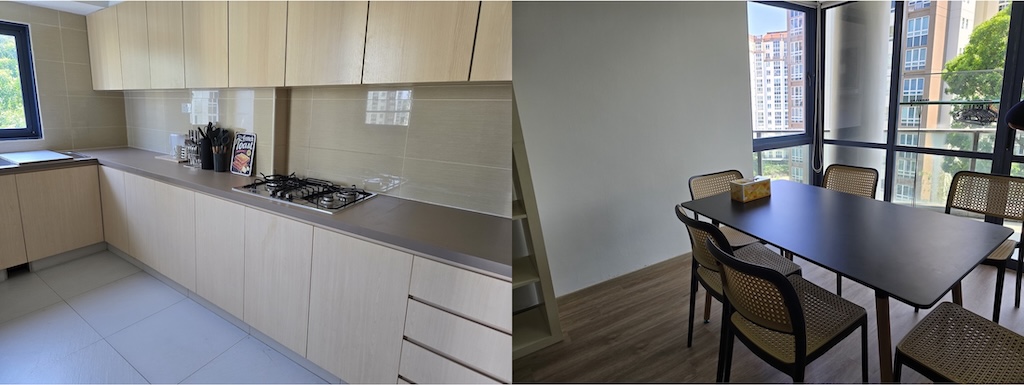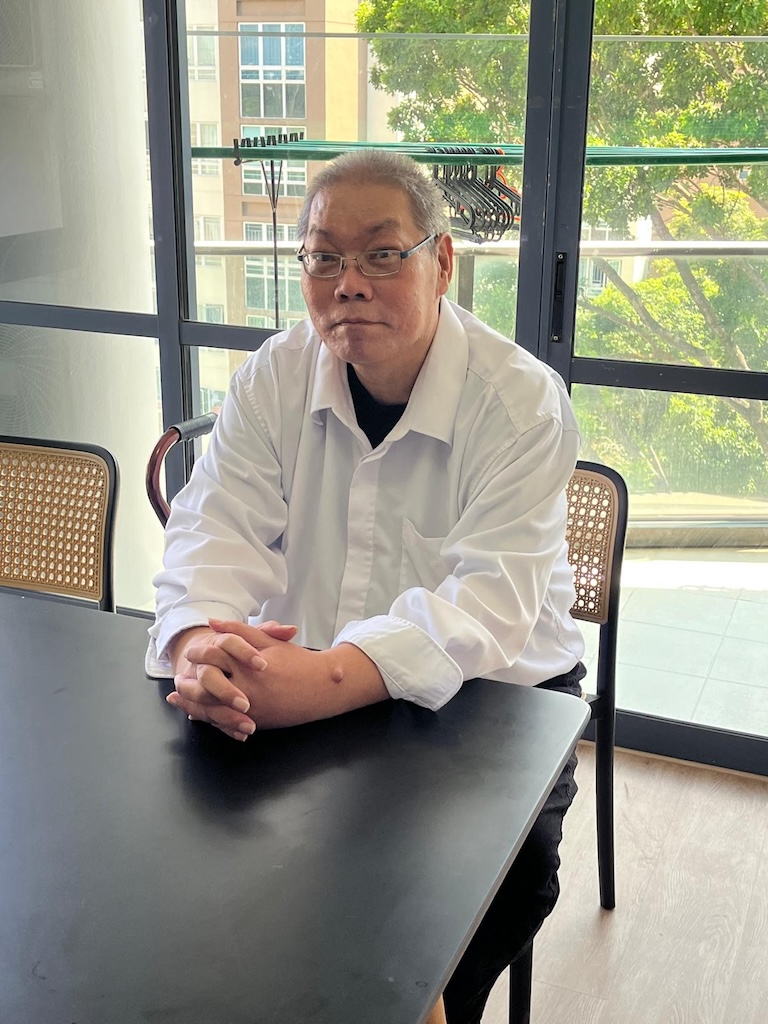A living lab at Temasek Polytechnic
Students from various disciplines get real-world training in eldercare, while the seniors enjoy regular interactions and meals.

Raffles Lim, left with other students from the Diploma in Food, Nutrition & Culinary Science at Temasek Polytechnic – Wee Yik Hon, 18; Daryl Thoe, 19; Low En Yu, 18; and Rayden Kho, 18.
Raffles Lim took care of his 66-year-old aunt for five years when she stayed at his home. Though she was sedentary, the 21-old-year would sometimes have to cook for her, take her to the market and accompany her on errands. He also occasionally visited his 84-year-old grandmother. He never thought these experiences would become useful in his final year in the Diploma in Food, Nutrition & Culinary Science at Temasek Polytechnic (TP).
Come October this year, he will be part of a group of students in his discipline as well as students in the Diploma in Culinary & Catering Management, who will be designing, preparing and serving residents of Singapore’s first campus-based assisted living facility called St Bernadette Lifestyle Village@TP. They will make sure the meals meet dietary needs such as low sugar and salt, or even soft-texture diets.
A campus environment

Residents’ dinner.
St Bernadette Lifestyle Village@TP has four assisted living apartments – two for men and two for women, with each apartment accommodating five residents. As part of its pilot phase, there are only four seniors, with plans to scale up gradually. The residents choose a twin-share room at a cost of S$3,600 a month (inclusive of meals) with a private bathroom or S$4,800 a month for a single room. The men’s and women’s quarters are in different apartments. All the apartments have common areas such as the kitchen, living room, dining area and an extra bathroom.
There are also several features in each apartment, including grab bars, slip-resistant flooring, invisible grilles, smoke alarms, ramps and barrier-free access in the space. There are personalised “memory boxes” and gender-specific visual cues (e.g. a horse carriage for men and colourful parrots for women) to assist residents with cognitive impairments, and lockable drawers where residents manage their belongings independently. Eligible seniors must be able to perform at least four of the six Activities of Daily Living (ADLs) to be at St Bernadette Lifestyle Village@TP .
In each of the apartments, there are two staff staying in the utility room, as part of the Shared Stay-in Senior Care Services Sandbox which St Bernandette is participating in and is jointly supported by the Ministry of Health and the Ministry of Manpower. Also, medical professional will make regular visits to the apartments to manage medication regimes, administer injections when needed, and oversee chronic disease monitoring. The apartments are located in one of three buildings that regularly houses international faculty and/or students who are on exchange programmes with TP.

Twin-share room.
Shared Dr Belinda Wee, co-founder and director of St Bernadette Lifestyle Village@TP, on the launch of the facility: “I daresay we are witnessing history in the making as my research has not shown any other senior care facility situated in an institution of higher learning in the world.” She is also the co-founder and director of Good Shepherd Loft, Providence Training Academy and the Assisted Living Facilities Association of Singapore.
As the nation’s population ages, the demand for person-centred eldercare solutions continue to grow. At the same time, there is a pressing need for a well-prepared workforce that is not only technically-trained, but also attuned to the lived experiences of seniors. By embedding a senior living within an educational setting like what is being done with St Bernadette Lifestyle Village@TP, the collaboration creates an intergenerational environment that integrates learning, wellness and community. Through this collaboration, TP students like Raffles can gain invaluable experience in eldercare and seniors can age meaningfully within the TP community.

The kitchen and the dining area.
Added Dr Wee, “The opportunity to train our next generation of eldercare professionals in an always short-staffed industry in this collaboration is indeed exciting.”
Not only will the Food, Nutrition & Culinary Science disciplines be involved with the residents, but also those in Gerontology, Culinary & Catering Management, Pharmaceutical Science and Medical Biotechnology. From academic year 2025, these students will undergo immersive, real-world training in eldercare through internships, projects and practicums. Besides nutrition planning, these students will support St Bernadette Lifestyle Village@TP’s residents in routines like medication management and community engagement, while gaining critical industry skills. They will also support the residents’ physical and emotion well-being, and build empathy and soft skills through day-to-day interactions.
For instance, students from the Diploma in Social Sciences in Gerontology at TP’s School of Humanities & Social Sciences will gain immersive, hands-on experience by applying their knowledge of ageing, care models and community engagement directly with the seniors. These experiences will be vital for them in deepening their understanding of person-centred care while further gaining empathy and communication skills.
For Raffles, being a part of the food process for the residents, he will have to consider the seniors’ various chronic diseases and how best to prepare their meals such as for those with sarcopenia, a high intake of protein is vital. He and the other students will be responsible for the seniors’ meals on the weekdays (other meals will be prepared by St Bernadette’s staff on-site) and making “food flavourful”. He will also be picking up some understanding about food processes such as the cook-chill method where food is cooked and blast-chilled for safety and quality.
Interaction is key
But how exactly will the seniors benefit from being a part of this living lab? The residents get to enjoy regular interaction with the students. They will have opportunities to mentor the students and share their life stories thereby fostering a sense of contribution and purpose. They will also participate in social activities from shared meals to movie nights to support their emotional, cognitive and social well-being.

One of the residents, Yeak Choon Eng.
For one of the residents, 60-year-old Yeak Choon Eng who suffered a stroke four months ago and started living at St Bernadette Living Village@TP one month ago, he couldn’t be happier to get away from the hospital and nursing home food. “Here, it is homely and I get home-cooked meals that taste nice. I also feel young mixing with the students.”
Arthur Foo, deputy director, School of Humanities & Social Sciences, shared further about the engagements the students will have with the seniors: “These engagements sustained over time allows for deeper relationships to form and will indeed be a living laboratory that ultimately benefits students and staff, as well as uplifting the quality of life for seniors residing here.” He added that research shows that intergenerational contact improves the well-being of older adults while helping young people develop empathy, communication skills, and a deeper understanding of ageing.
He continued: “For our students, this facility represents a valuable learning opportunity. The technical skills they develop in their courses are important, but equally valuable are the human connections they’ll form here. These relationships will inform their professional practice and personal understanding in ways that no textbook ever could.”

0 Comments